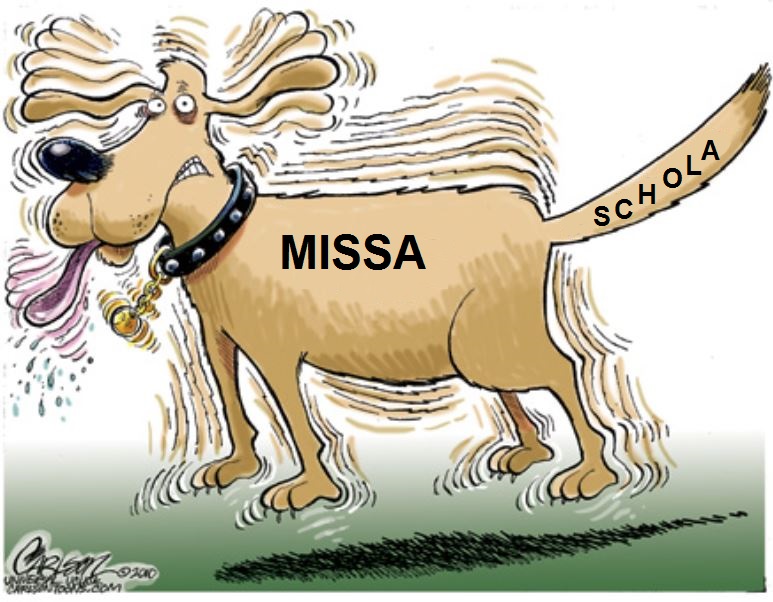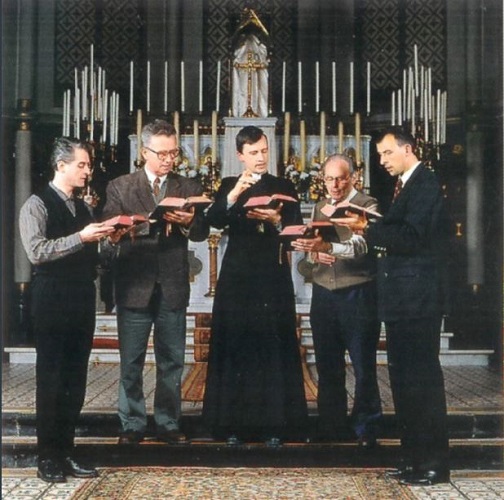
A good choir Conductor humbly accepts his limits and those of his singers,
instead of dreaming in color.
[Source left, Source right]
Let's Adore Jesus-Eucharist! | Home >> Lost Sermons

A good choir Conductor humbly accepts his limits and those of his singers,
instead of dreaming in color.
[Source left,
Source right]
I love going to Mass, especially if the priest still has the Catholic Faith! I also like Gregorian Chant, because it elevates the soul toward Heaven (when it's well sung). Because of these two loves, I become almost enraged when I see a "priest" who puts graffiti on the liturgy, or when I hear a choir that drags souls down to Earth by vandalizing Gregorian Chant.
I don't know much about best practices for conducting a Gregorian chant choir (i.e. a "schola"), or the technique of Gregorian "Chironomy", or all the technical names of "neumes" (Gregorian musical notation), or "solfège", etc.
That being said, I do know some things which must not be done when conducting a Gregorian choir. This article is a summary of some of the worst musical experiences I've heard in churches, over the years, in Canada and in the United States.

Poor soul trying to pray while a bad choir drags it down toward Earth.
[Source]
I have many fond memories of Father Guillaume Loddé. I remember that he sometimes came up to the choir loft to practice Gregorian chant with the choir (thus, by taking care of it personally, he showed the importance of Gregorian chant). He told us that singing is not essential to the Mass, that if we had a doubt about one song or the other, we just needed to tell him, and he would simply recite the words. No anxiety. Either we know the song and we sing it well, or we rest a bit and the priest reads the words.
I remember musical experiences so painful, that I just got up and went outside, while waiting for the choir to finish. On the contrary, I remember many Masses where the choir was absent, and where I was able to pray in peace while following in my Missal. This is one of the reasons why, paradoxically, Masses on weekdays are often more dignified and edifying than Sunday Masses. It seems like on Sundays, demons are unleashed so as to attack even more what is most sacred.

It's the dog that should wag the tail, not the schola that should wag the Mass.
[Source]
I remember that when I was learning how to serve Mass, good Mister Domingue, who is like the Biblical widow serving the LORD in his temple day and night [Lc 2:37], had told me that the priest comes first. Whatever the Mass servant does, he must do it to help the priest, facilitate his work, support him, and so on. Some examples: laying out the liturgical vestments in a very precise order on the sacristy's counter, so that the priest will be able to put them on almost automatically, without being disturbed in his preparatory prayers before Mass. Or holding out the wine cruet with the handle pointed toward the priest, so that he does not have to struggle to grab the cruet properly. Or lifting the priest's alb a little before he climbs steps, so he doesn't have to worry about getting entangled in it, etc.
There are a thousand and one ways for the choir to "wag the Mass", to put itself first while pushing the priest aside. For example, when there is a short "placeholder" song or musical piece. If the choir (or the organist) makes the priest wait, it's a way of saying: "Hey, you priest, you are ready to continue the Mass, but the choir has not finished, so bite me!" It can also be a song that is delayed, and makes the priest wait again. Or a choir conductor who does not manage his organist, and who lets the organist "bury" the priest (or even the whole choir) by playing too loudly.

Femen trying to kidnap Baby-Jesus from the Vatican nativity scene.
[Source]
One of my worst choir memories is so weird, you might not believe me. The choir conductor was obese. To be honest, she had a huge behind. I know, because she wore black tights, and she had placed the choir at the front of the church, next to the altar (as opposed to the choir loft at the back of the church), and she stood on a chair to lead the choir, literally "buttocks to the people", while gyrating her huge backside to the beat of the music.
Unbelievable, but I have witnesses. The poor lady died a few years ago. Pray for her. What's worse in this story is not that some poor woman was a bit disturbed in her head. There are loonies everywhere. The bad part is that a priest lacked virility, and let such things pass.
Notice the picture above, where you can see a female trying to "kidnap" baby Jesus from the manger at the Vatican. You can also see a policeman who will put an end to this silliness. This is often what bad choirs lack: a priest who can put on his pants and "take out the trash" like a he-man.

[Source]
Some will say I'm evil, that church choirs are normally composed of volunteers who don't make a penny for all their work (practices, rehearsals, Masses, not to mention Holy Days and other holidays where you have to sing even more, and travel even more often to the church). I am well aware of all this, having sung a few years in a Gregorian chant choir. I even remember that in my first year, after the last Easter ceremony, I had slammed the door on the choir for three weeks, because I was so exhausted by the workload! And I was only a singer, not the Conductor! (The conductor's workload is far worse.)
According to me, the Catholic Church isn't evil, and the good Lord doesn't lay on us burdens impossible to carry. The Church wants the liturgy to be embellished with Gregorian chant, so there must be a solution. Here, despite my lack of diplomas in this field, is what I would do to rescue a choir in distress:
5.1) You attract flies with honey, and new choir members with public successes. The famous Edward Deming often repeated: "12) Remove barriers that stand between the [...] worker and his right to pride of workmanship". Few people will give their time to be publicly humiliated. But if the choir conductor prepares victories for his singers, they will be able to reap the pride of work well done, compliments of the crowd, their pastor's praise, and especially Ad majorem Dei gloriam!
5.2) No mastery? No sing-y! For example, if a pianist masters two pieces at the piano, and is just starting to learn a third, and if he has to give some recital in front of spectators, then he'll play two pieces, not three! Non multa, sed multum. Indeed, being able to tell the difference between a well-executed work, and something botched, is the first talent required of any artist. It's also the easiest talent to acquire, which makes it even more insulting to spectators when they are forced to sit through a botched interpretation.
5.3) Ruthless prioritizing. No polyphonic songs (which are accessory) as long as we don't master all the official chants of the liturgy. No singing of the Proper (normally five pieces: the Introit, the Gradual, the Hallelujah or Tract, the Offertory and the Communion) as long as we don't master the songs of the Common (Gloria, Credo, Sanctus, Agnus). No songs for less important occasions as long as we don't master songs for the big holidays, like Easter, Christmas, etc.
5.4) Great openness for practices, great selectivity for Masses. You want to practice with the choir? No problem! The door is wide open! Bring your friends! Bring your dog! Donuts and coffee are on us! On the other hand, for Mass, only those who have proved their mastery of the songs can climb up the choir loft.
5.5) One single voice. To sing in a Gregorian chant choir, you must have the capacity to avoid standing out from the others. If you can listen to a choir and say, "There, I hear Mrs. X, or Mr. Y", the choir conductor has failed.
5.6) We don't work without a safety net. Of course, "real" Gregorian chant is done without being accompanied by an organ. But we are talking here about the special case of a choir rich in good intentions, and, and..., and rich in good intentions!
A good organist will be able to play very discreetly, with simple arrangements, just enough to be a safety net for the choir. Actually, with an electronic organ, the organist can play just to be heard by the singers, and almost not at all by the rest of the congregation. Thus, even inexperienced singers will not "lose the melody" or sing off-key. In the Army, we were told: "Better a lion who commands a group of sheep, than a sheep in command of a group of lions." It's somewhat similar for Gregorian chant: the less talented your singers, the more you need a good organist.
5.7) He who would go far, spares his mount. If the singers have ten hours a week to devote to practicing and rehearsals, then of course we can learn more songs. But if the singers have one hour a week, the number of songs to learn must be greatly reduced. Along the same line, if the Conductor wants to teach a song in this book, and another in this other book, and another on a photocopied sheet, etc., to the point where singers need to constantly lug around a heavy backpack filled with paper products, the "horses" may get tired faster...
5.8) Try not to sound like a herd of cows galumphing through a river of molasses in the Wintertime. Of course you need to be able to correctly sing all the notes, one after the other. But often, once you've managed to get at least that, the second main obstacle is speed and continuity. I'm sure it's possible to sing too fast and with not enough interruptions, but normally beginners sing much too slowly, and stop too often and all together to catch their breath.
5.9) We learn to howl with the wolves. In the bad old days, to learn Gregorian chant by imitation, you needed to give up all your belongings, forget about sex forever, and always do the will of your Superior. In other words, you needed to become a monk, then sing along with experienced monks, every day for seven years, to be considered a tolerably trained Gregorian singer. Thank God these days we have MP3 players! Just find a good Gregorian chant schola, load the whole liturgical year on your device, and listen! Listen to them while doing chores in the house, listen to them in your car, sing along with them, sing along but then shut off your device to see how long you can sing by yourself without them, etc. (I currently try to imitate the Schola Bellarmina.)

I remember a Gregorian chant choir where, in addition to normal adult singers, there were several children who followed their parents to the choir loft, and who gurgled somewhat randomly, trying to imitate their elders. Since they didn't have loud voices, and they were well-behaved, they didn't bother us. And we figured that maybe some day they would join the real choir, so we encouraged them to come.
One day when the Conductor had been forced to deal (yet again) with thorny human relation problems with choir members, she had sighed: "There are two choirs in this church: one for children, and one for crybabies!"
Indeed, conducting a Gregorian choir is 5% musical knowledge, and 95% human relations! Fortunately, an excellent recipe for human relations is appropriately given by a famous Gregorian Chant: "Ubi caritas". It's sung on Maundy Thursday when the Priest washes the feet of twelve parishioners, to imitate Christ's humility and charity:
Where charity and love are, God is there.
As we are gathered into one body,
Beware, lest we be divided in mind.
Let evil impulses stop, let controversy cease,
And may Christ our God be in our midst.
Let's Adore Jesus-Eucharist! | Home >> Lost Sermons